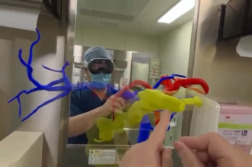BOSTON, Mass. (Ivanhoe Newswire) — Each year in the U.S., more than 66,000 people are diagnosed with pancreatic cancer. 51,000 will die from it. It’s the third leading cause of death from cancer. Because symptoms are vague, including fatigue, stomach pain, back pain and weight loss, almost 80% of patients are diagnosed after the cancer has already spread. Just 13% live more than five years after diagnosis. But now, AI may help doctors know who is more at risk of this deadly disease and diagnose it before it’s too late.
From the prep work to the riding — Don Wexler loves everything about biking. Don’s been riding 30 to 60 miles, three to four days a week for the past four decades — even after being diagnosed with stage four pancreatic cancer.
“I was just maybe just bullheaded and ignorant and just plowed on. I kept riding my bike,” he said.
But doctors found a tumor in his pancreas — another in his liver. Don was told he had 12 to 18 months to live.
“One of the reasons that there are so many deaths from pancreatic cancer is because it’s often diagnosed at a late stage,” explained Brian Wolpin, MD, MPH, Oncologist at the Dana-Farber Cancer Institute.
He says another problem is that there’s no regular screening for pancreatic cancer like there is for breast and colon cancers. But Dr. Wolpin believes harnessing the power of AI could change that. Dr. Wolpin’s team used artificial intelligence to find patterns in over nine million patients, looking at medical records, family history and genetic mutations. The algorithm was able to correctly predict pancreatic cancer in a high percentage of cases.
“We’ve learned that if we screen patients who have genetic mutations or strong family histories, we can find pancreatic cancer early,” stated Dr. Wolpin.
Don didn’t know he had a genetic mutation that made him high risk. But with new medication, chemo and radiation — eight years later, Don has beat the odds, is cancer free and hopes to be an inspiration to others.
“You gotta just keep doing what you do, keep living, keep exercising. ‘Cause I think doing that was one of the things that really helped me,” he recalled.
Dr. Wolpin believes AI will be an even more powerful tool for diagnosis when a patient’s full medical record, including current medications and scans, vitals and medical history are included in looking at high risk patients.
Contributors to this news report include: Marsha Lewis, Producer; Matt Goldschmidt, Videographer; Roque Correa, Editor.
To receive a free weekly e-mail on medical breakthroughs from Ivanhoe, sign up at: http://www.ivanhoe.com/ftk
Source:
https://pancan.org/news/pancreatic-cancer-five-year-survival-rate-increases-to-13/
FOR MORE INFORMATION, PLEASE GO TO https://www.dana-farber.org/cancer-care/types/pancreatic-cancer/treatment
If this story or any other Ivanhoe story has impacted your life or prompted you or someone you know to seek or change treatments, please let us know by contacting Marjorie Bekaert Thomas at mthomas@ivanhoe.com



